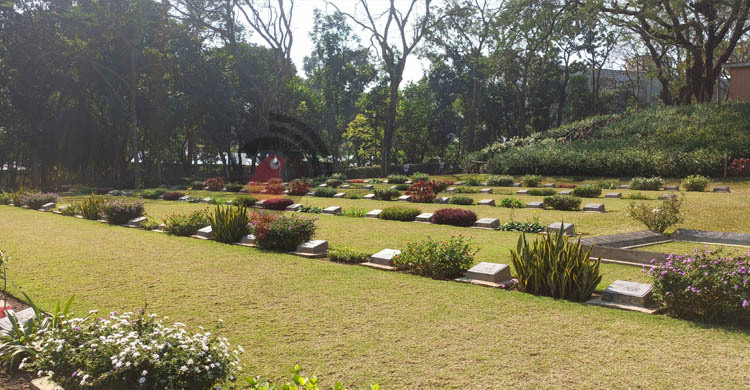Japanese WWII soldiers’ remains to return home from Cumilla

In a poignant act of reconciliation and remembrance, efforts are underway to exhume the remains of 24 Japanese soldiers buried at the historic Mainamati War Cemetery in Cumilla. The soldiers, casualties of World War II, will be repatriated to Japan, marking the culmination of years of diplomatic and logistical planning.
A seven-member forensic team from Japan began the delicate task of exhuming the graves on November 13, under tight security provided by local authorities. The operation, expected to conclude by November 24, is supported by the Bangladesh government and the Commonwealth War Graves Commission (CWGC), said Abdur Rahim Sabuj, Country Administrator for the Commonwealth War Graves Commission. Among the 737 soldiers from 13 countries interred there, 24 are Japanese.
Cumilla Deputy Commissioner Amirul Kaisar said that the Foreign Ministry, following approval from the Chief Adviser, invited the delegation. Local law enforcement, including the police, is ensuring security during the excavation work.
The sacred grounds of Mainamati
Nestled within the Cumilla Cantonment, the Mainamati War Cemetery is a solemn testament to the sacrifices of soldiers from 13 nations during World War II. The cemetery, meticulously maintained by the CWGC, holds 737 graves. Among these, 24 belong to Japanese soldiers, their final resting place until now.
In the past, the cemetery witnessed a similar act of repatriation when, in 1962, the remains of a US soldier were taken back by family members. Today, the Japanese government has undertaken a similar mission, seeking to honor their fallen soldiers.
Delicate excavations and emotional discoveries
The forensic team has already unearthed 10 graves, carefully preserving the remains, which include skulls and various bones. Kazi Sajjad Ali Zahir, a decorated liberation war hero, researcher and Independence Medal recipient, is playing a key role in the project.
“The remains are 81 years old, so it’s challenging to recover much,” Zahir explained. “We dig down two feet with excavators and then proceed manually, ensuring every fragment is treated with respect.”
One particularly moving discovery was the skull of a young soldier bearing a bullet mark. “He was just 28 years old,” Zahir said. “At that moment, I felt an urge to embrace him. His youth, his sacrifice—it’s heartbreaking.”
International cooperation
This project is a collaborative effort between Japan, Bangladesh, and the CWGC. The initiative, years in the making, gained momentum after Japan officially wrote to the Bangladeshi government last year. The Ministry of Foreign Affairs facilitated the process, and local law enforcement is ensuring the delegation’s security during the excavation.
“The Japanese government initiated this in 2013, but for various reasons, it was delayed,” Zahir recounted. “Now, with official approval, the work is finally progressing.”
The Japanese forensic team comprises six Japanese experts and one American, all highly skilled in handling remains from historic graves.
Remembering the fallen
The Mainamati War Cemetery stands as a global monument to the sacrifices of soldiers from diverse nations and faiths during WWII. Among the 737 buried: 172 were Muslim, 24 Buddhist, 2 Hindu, and the remaining were Christian.
Their nationalities were diverse, encompassing 357 from the UK, 12 from Canada, 12 from Australia, 4 from New Zealand, 1 from South Africa, 171 from undivided India, 3 from Rhodesia, 56 from East Africa, 86 from West Africa, 1 from Burma, 1 from Belgium, 24 from Japan, and 1 from Poland.
The site reflects the global reach of the war and the shared grief of loss across nations.
A tribute to sacrifice
As the remains of these Japanese soldiers prepare for their final journey home, this act underscores the enduring importance of honoring those who gave their lives in war. For Bangladesh, it is also a moment to reaffirm its commitment to cooperation, respect for history, and the dignity of the departed.
This quiet, somber effort serves as a reminder of the human cost of war and the bonds that can unite nations in remembrance and reconciliation.

